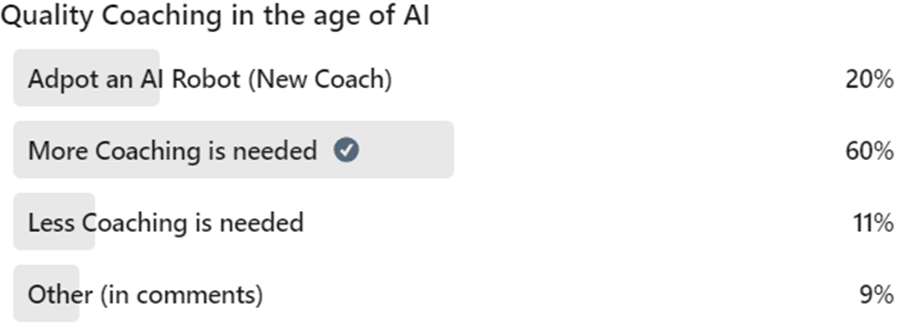
A few weeks ago, I posed a question on LinkedIn about the intersection of Quality Coaching and AI, intrigued by how individuals in coaching roles might embrace AI. This sparked several thought-provoking inquiries:
- What adjustments must be made?
- How can we effectively cultivate team awareness regarding AI’s relevance?
The response “More coaching is needed” garnered the highest number of votes

This tells us a great deal. It signals new challenges for teams and organizations concerning AI, suggesting a need for additional support and, consequently, more coaching. It also indicates that teams will need to adapt to new working methods, leveraging AI advantages for tasks that can be automated or enhanced by AI.
Let’s delve into the potential advantages AI could offer in a coaching role. I’ll explore some examples in the next paragraphs and conclude the blog with lingering questions about AI and Quality Coaching.
How can AI help you in your coaching role?
Considering the positive side, can AI be helpful? Certainly, and here are some potential advantages:
Reliable Team Member: AI robots are reliable and won’t abandon projects unexpectedly. Unlike humans, they provide a solid knowledge base for projects, ensuring crucial information is readily available. Would you welcome a robot as a new team member?
Coaching Partner: AI can assist in asking better questions if the context and team struggles are well-understood. By harnessing AI’s capabilities, you can receive powerful open questions from ChatGPT, enhancing coaching effectiveness.
Personalized Strategies: AI, like ChatGPT, can offer feedback on coaching strategies and propose actionable steps, particularly beneficial for novice coaches.
ChatGPT, when asked to help create a quality coaching strategy for a Scrum team of 8 members struggling with testing, provided a myriad of ideas. While some suggestions may be useful, deep reflection is necessary before implementation. Here are four tips from the extensive list:
Peer Reviews and Pair Programming: Foster a culture of learning and knowledge sharing within the team by incorporating peer code reviews and pair programming sessions.
Automated Testing: Streamline the testing process and make it less burdensome for developers by introducing automated testing tools and frameworks.
Education and Awareness: Educate the team about the importance of testing in Agile development and highlight its benefits, such as identifying bugs early and ensuring product quality.
Feedback Mechanism: Establish a feedback mechanism where developers can provide input on the testing process, fostering open communication and continuous improvement.
Particularly noteworthy is the emphasis on actively listening to developers, involving them in testing processes, educating them, and addressing their concerns.
Additionally, robots’ neutral emotional state ensures unbiased coaching, unaffected by a coach’s mood or circumstances. They also excel at providing accurate references, accelerating research efforts.
More Questions about AI and Quality Coaching
Numerous questions arise regarding Quality Coaching in the age of AI:
- How do you envision AI augmenting our current quality coaching practices to accelerate value delivery within our organization?
- In what ways can AI enhance the effectiveness and efficiency of our quality coaching initiatives?
- What specific challenges or opportunities do you foresee in integrating AI technology into our quality coaching processes, and how can we address them?
- How might leveraging AI in quality coaching empower our teams to achieve higher levels of performance and productivity?
- What metrics or indicators do you think are essential for measuring success and impact?
- How can we ensure that the introduction of AI in quality coaching aligns with our organizational values and culture?
- What potential risks or limitations do you perceive in relying on AI for quality coaching, and how can we mitigate them effectively?
- In what ways can AI-driven insights complement the expertise and experience of our quality coaches to drive continuous improvement?
- How do you envision the role of top management evolving in a future where AI plays a significant role in quality coaching?
- What steps can we take to foster a culture of innovation and experimentation as we integrate AI into our quality coaching practices?
I’m curious to hear your perceptions about quality coaching and AI, as well as any potential future actions we could take.

 English | EN
English | EN 